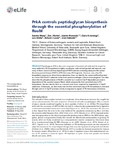PrkA controls peptidoglycan biosynthesisthrough the essential phosphorylation ofReoM
Wamp, Sabrina
Rutter, Zoe J
Rismondo, Jeanine
Jennings, Claire E
Möller, Lars
Lewis, Richard J
Halbedel, Sven
Peptidoglycan (PG) is the main component of bacterial cell walls and the target formany antibiotics. PG biosynthesis is tightly coordinated with cell wall growth and turnover, andmany of these control activities depend upon PASTA-domain containing eukaryotic-like serine/threonine protein kinases (PASTA-eSTK) that sense PG fragments. However, only a few PGbiosynthetic enzymes are direct kinase substrates. Here, we identify the conserved ReoM proteinas a novel PASTA-eSTK substrate in the Gram-positive pathogenListeria monocytogenes. Our datashow that the phosphorylation of ReoM is essential as it controls ClpCP-dependent proteolyticdegradation of the essential enzyme MurA, which catalyses the first committed step in PGbiosynthesis. We also identify ReoY as a second novel factor required for degradation of ClpCPsubstrates. Collectively, our data imply that the first committed step of PG biosynthesis is activatedthrough control of ClpCP protease activity in response to signals of PG homeostasis imbalance.
Files in this item

